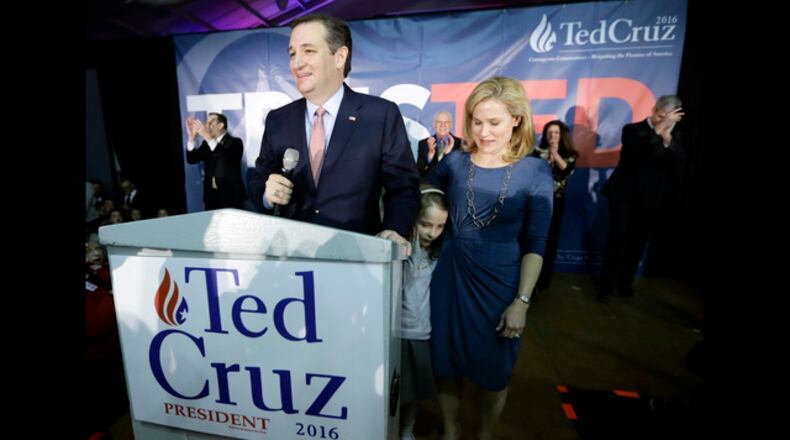The biggest surprise out of Iowa was probably the absence of surprises.
The Democratic race was predicted to be tight, and it proved exceedingly tight. On the GOP side, Ted Cruz, Donald Trump and Marco Rubio did indeed finish within a handful of percentage points of each other, as suggested here yesterday, with Trump significantly underperforming what the pollsters were predicting and Rubio benefiting from that failure.
Trump has taken some damage with this loss, but I suspect that those talking excitedly about how Iowa has punctured his aura of invincibility are telling us more about their own anxieties than about Trump. Yes, a Trump loss is a helluva lot better for the Republican Party than a Trump win would have been, but let's keep it in perspective. The developer has dealt with far greater setbacks in his business life, learned from them and come back stronger. That, not an unending string of triumphs, is what his reputation as a winner is built upon. In this case, a small defeat may very well focus his attention where it hasn't been, on the blocking and tackling of politics, and in the end produce a more dangerous candidate. Iowa has given his opponents hope that they otherwise would not have had, which is important. But the Trump phenomenon is a long, long way from playing out.
For an example of someone who did the blocking and tackling very well and was rewarded for it, Trump can look no further than that cagey Canadian, Ted Cruz. Whatever else you may think of Cruz, the man has endless ambition, a sharp sense of strategy and the discipline that is needed to implement that strategy, day after day and week after week. Those traits define the arc of his political career and have so far allowed him to overcome an absence of credible warmth that would cripple most other politicians. I still doubt that combination will allow him to thrive in the long term, but it certainly did in Iowa. It was a well-earned victory.
However, while Cruz got the most GOP votes, the biggest winner of the night was Rubio. With 23 percent of the vote, he crushed the four governors -- Jeb Bush, John Kasich, Mike Huckabee and Chris Christie -- who combined couldn't reach double-digits. If Rubio has competition for the so-called establishment vote, that's where it's going to come from, and none of the four showed any signs of life. (Huckabee has wisely "suspended" his campaign.) The door now opens for a strong second-place showing by Rubio in New Hampshire next week, and if that happens Rubio's argument for himself as the mainstream's best shot would become hard to refute for voters, funders and most importantly opponents.
Finally, let's not overlook the fact that together, Cruz and Trump pulled 52 percent of the GOP vote in Iowa, with the hapless Ben Carson managing another 9 percent. The discontent still runs very deep, and remains the animating force in this election cycle.
On the Democratic side, Iowa ended in a virtual tie, with Hillary Clinton clinging to a lead so small it has to be measured on a nanoscale. In fact, "nondefeat" is a more apt description than "victory," but Clinton is probably happy to take it and move on. Iowa again exposed both her strengths and her weaknesses, as a highly professional campaign barely compensated for a candidate still struggling to meld the moment with the message.
For Bernie Sanders, a message for this moment isn't a problem, and his showing was impressive. Watching this campaign play out, it's as if he and his followers keep trying to tell Clinton something, and she keeps repeating a vague, dissatisfying echo of it back to them. They keep trying to tell her that it's not just safe, but necessary, to talk in blunt terms about what is happening in the American economy, and she keeps not quite believing it.
Part of it's because politically, she's more conservative than Sanders, but the bigger issue is that she's more conservative in personality as well. Compared to her husband Bill, compared to Barack Obama and compared to Sanders, she is by nature more risk averse and less open. That's just who she is, and she's struggled with that throughout her career. She is just never going to be confused with a rebel or a "character".
Obama -- who has studied Hillary better than most, both as opponent and colleague -- described her predicament well in an interview with Politico:
"Her strengths, which are the fact that she's extraordinarily experienced – and, you know, wicked smart and knows every policy inside and out – sometimes could make her more cautious and her campaign more prose than poetry, but those are also her strengths. It means that she can govern and she can start here, [on] day one, more experienced than any non-vice president has ever been who aspires to this office."
But to govern, you first have to be elected. Sanders is taking her to school, teaching her what getting elected is going to take, forcing her out of the personal and ideological shell where instinct tells her to stay. I think when this is over, Clinton may look back and recognize that Bernie Sanders was the best thing that could have happened to her.
He isn't Obama. And to Clinton's relief, he also isn't Elizabeth Warren ...
About the Author
The Latest
Featured



